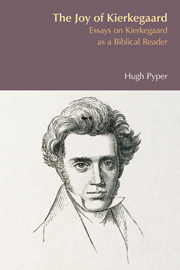Book contents
- Frontmatter
- Contents
- Preface
- Acknowledgments
- Abbreviations
- 1 The Joy of Kierkegaard
- 2 Kierkegaard's Canon: The Constitution of the Bible and of the Authorship in Concluding Unscientific Postscript
- 3 The Apostle, the Genius and the Monkey: Reflections on Kierkegaard's ‘The Mirror of the Word’
- 4 Your Wish Is My Command: The Peril and Promise of the Bible as ‘Letter from the Beloved’
- 5 The Lesson of Eternity: The Figure of the Teacher in Kierkegaard's Philosophical Fragments
- 6 Cities of the Dead: The Relation of Person and Polis in Kierkegaard's Works of Love
- 7 Adam's Angest: The Language of Myth and the Myth of Language
- 8 Beyond a Joke: Kierkegaard's Concluding Unscientific Postscript as a Comic Book
- 9 ‘Sarah Is the Hero’: Kierkegaard's Reading of Tobit in Fear and Trembling
- 10 How Edifying Is Upbuilding? Paul and Kierkegaard in Dialogue
- 11 Forgiving the Unforgivable: Kierkegaard, Derrida and the Scandal of Forgiveness
- Bibliography
- Index of Biblical References
- Index of Authors
Preface
- Frontmatter
- Contents
- Preface
- Acknowledgments
- Abbreviations
- 1 The Joy of Kierkegaard
- 2 Kierkegaard's Canon: The Constitution of the Bible and of the Authorship in Concluding Unscientific Postscript
- 3 The Apostle, the Genius and the Monkey: Reflections on Kierkegaard's ‘The Mirror of the Word’
- 4 Your Wish Is My Command: The Peril and Promise of the Bible as ‘Letter from the Beloved’
- 5 The Lesson of Eternity: The Figure of the Teacher in Kierkegaard's Philosophical Fragments
- 6 Cities of the Dead: The Relation of Person and Polis in Kierkegaard's Works of Love
- 7 Adam's Angest: The Language of Myth and the Myth of Language
- 8 Beyond a Joke: Kierkegaard's Concluding Unscientific Postscript as a Comic Book
- 9 ‘Sarah Is the Hero’: Kierkegaard's Reading of Tobit in Fear and Trembling
- 10 How Edifying Is Upbuilding? Paul and Kierkegaard in Dialogue
- 11 Forgiving the Unforgivable: Kierkegaard, Derrida and the Scandal of Forgiveness
- Bibliography
- Index of Biblical References
- Index of Authors
Summary
This collection of essays represents nearly twenty years of writing on the work of Kierkegaard, although my reading of him goes back forty years at least. They share the aim of showing that the Bible is a key to understanding Kierkegaard and that what passionately concerned him was the task of showing how the most troubling, puzzling and offensive passages of the Bible bring a message of good news and of joy.
When, for example, Kierkegaard in the guise of Johannes Climacus explores the story of Abraham and Isaac in Fear and Trembling, we would be quite wrong to suppose that, through philosophical reflection, he came up with the notion of the teleological suspension of the ethical and then cast around for a biblical story to illustrate his point. Quite the contrary: it is as he reads the story of Abraham's preparedness to sacrifice his son Isaac, which is not only an Old Testament passage, but is held up by Paul in the New Testament as a paradigm example of true faithfulness, that the need for philosophical reflection becomes apparent. How can this appalling tale, which has shocked the ethical sensibilities of many philosophers, be taken as an example for Christian conduct? The answer must either be that Paul is quite mistaken and morally suspect for suggesting this, or that something other than Kantian morality is at stake here, something that opens up seemingly impossible possibilities for us.
- Type
- Chapter
- Information
- The Joy of KierkegaardEssays on Kierkegaard as a Biblical Reader, pp. vii - xPublisher: Acumen PublishingPrint publication year: 2012



